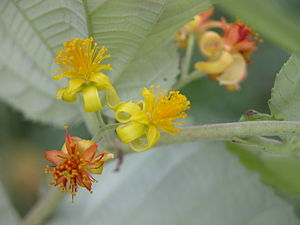Grewia asiatica
| Grewia asiatica | |
|---|---|

| |
| Flowers and leaves | |
| Scientific classification | |
| Kingdom: | Plantae |
| Clade: | Angiosperms |
| Clade: | Eudicots |
| Clade: | Rosids |
| Order: | Malvales |
| Family: | Malvaceae |
| Genus: | Grewia |
| Species: | G. asiatica
|
| Binomial name | |
| Grewia asiatica | |
| Synonyms | |
| |
Grewia asiatica (phalsa or falsa) (Urdu: فالسہ , Hindi: फ़ालसा, Gujarati Language: ફાલસા ) is a species of Grewia native to southern Asia from Pakistan east to Cambodia, and widely cultivated in other tropical countries.[2][3] Grewia celtidifolia was initially considered a mere variety of Phalsa, but is now recognized as a distinct species.
It is a shrub or small tree growing to 8 m tall. The leaves are broadly rounded, 5–18 cm long and broad, with a petiole 1–1.5 cm long. The flowers are produced in cymes of several together, the individual flowers about 2 cm diameter, yellow, with five large (12 mm) sepals and five smaller (4–5 mm) petals. The fruit is an edible drupe 5–12 mm diameter, purple to black when ripe.[2][4]
Cultivation and uses
It is extensively cultivated for its sweet and sour acidic fruit, which are sold in the market during summer months under the name falsa. The sherbet or squash is prepared from the fruit pulp by mixing it with sugar and used as an astringent, stomachic and cooling agent.
The root is used by Santhal tribals for rheumatism. The stem bark is said to be used in refining sugar, for making ropes and its infusion is used as a demulcent. The leaves are used as an application to pustular eruptions. The buds are also prescribed by some physicians.[5]
It has become naturalised and locally invasive in Australia and the Philippines.[3][4][6]
References
- ↑ http://www.theplantlist.org/tpl/record/kew-2832898
- ↑ 2.0 2.1 Flora of India Grewia asiatica
- ↑ 3.0 3.1 Pacific Island Ecosystems at Risk: Grewia asiatica
- ↑ 4.0 4.1 Flora of Western Australia: Grewia asiatica
- ↑ Purdue University: Fruits of warm climates: Phalsa
- ↑ Yadav, A. K. (1999). Phalsa: A Potential New Small Fruit for Georgia. pp.348–352 in: Janick, J. (ed.). Perspectives on new crops and new uses. ASHS Press. Available online.
Lua error in Module:Taxonbar at line 144: attempt to index field 'wikibase' (a nil value).